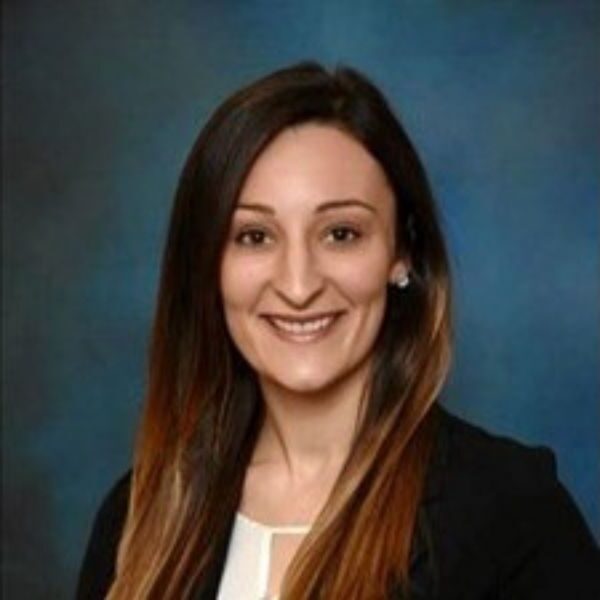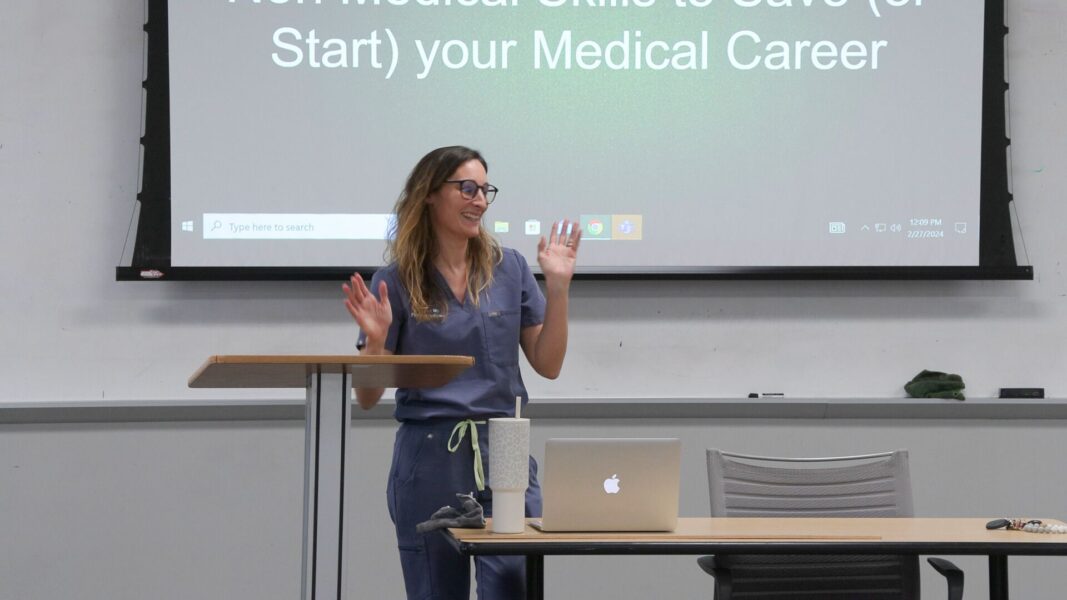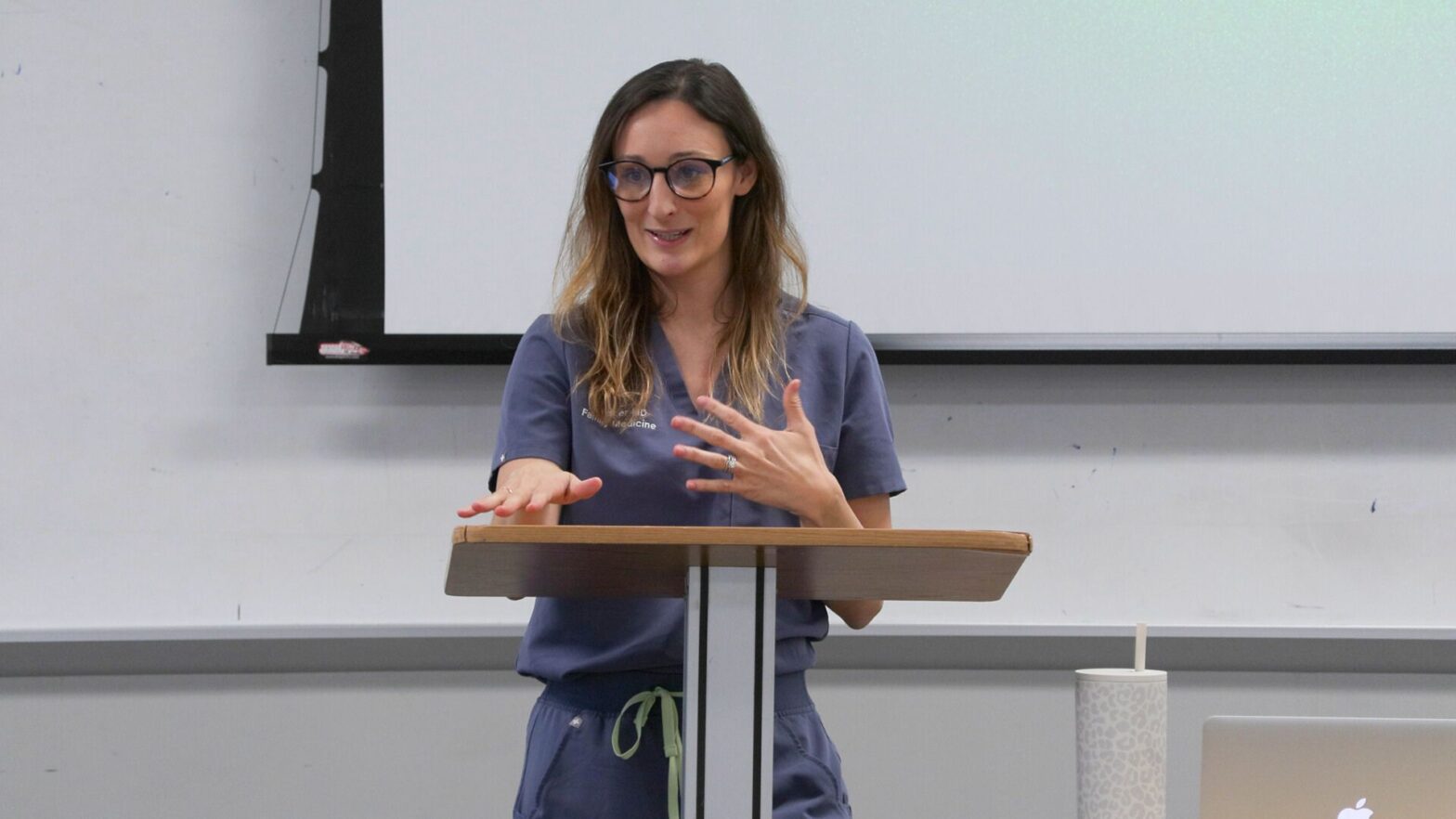It’s no secret that it takes some guts to enter the medical field.
That’s why family medicine physician Jaimie Fager ’14 presented invaluable advice to Newman students within the Honors Program during a lunch event in February.
As an Honors Program graduate, Fager jumped at the chance to revisit campus and connect with students.
“I was in your seats what feels like five minutes ago and I’m being told is over 10 years ago, which is a little weird,” Fager said. “It feels really good to finally be able to say I’m a family medicine doctor, and you will all get there, I promise.”

Fager opened her own direct primary care practice, Integrity Medicine, in 2022 in Andover, Kansas. Rather than charging insurance to see patients, Fager’s patients pay a monthly subscription providing them unlimited access to a physician with no extra billing.
“This model essentially spreads out the financial burden on patients and on us so that I don’t have to pay a biller, a coder and I don’t have to pay someone to fight with insurance. It is literally me and a nurse who takes care of patients, which is the way I think it should be.”
‘Non-medical skills to save (or start) your medical career’
Below is a highlight reel of Fager’s biggest takeaways and essential skills in health care. Watch or listen to the full episode of “Newman Bond” podcast to learn more about Fager’s journey and advice.
- “Get to know yourself, your worldview and what your natural strengths and weaknesses are before entering the field.”
- “You have to be relentlessly curious because you’ll be learning new things every single minute.”
- “Absolutely do not do medicine or healthcare for the money.”
- “Practice being uncomfortable and step outside of your comfort zone.”
- “Be able to write, write creatively and in a way that people find interesting (particularly if you want to write the interesting books about medicine and have those interesting conversations with people).”
- “Leadership is a learned skill and something that you have to cultivate intentionally.”
- “Take responsibility and take ownership of things when you mess up. Don’t let yourself fall into that trap of doing what everybody else is doing.”
- “Travel, travel, travel. You cannot do medicine without cultivating empathy, and you develop empathy by understanding others.”
- “You have to take care of people regardless of what their background is, regardless of what they’re there for.”
- “The more you can get out of your time at Newman, the better because you likely won’t have time in medical school.”

- “Start things like Roth IRAs when you have no money and put a little bit into it so it grows for the next 10 years while you’re still doing training.”
- “Learn how to balance the humility with boldness when it comes to health care and medicine. Be confident when it comes to saying what you know, as well as what you don’t.”
- “What makes the difference between a good medical school applicant and all the others and who gets into medical school —most of the time — is the interview…. Things like ethics and morals and life experience outside of medicine should come across in the interview.”
- “Advocate for yourself.”
- “Make time for yourself and draw boundaries if you need to.”
Fager’s book recommendations
- Be the Unicorn: 12 Data-Driven Habits that Separate the Best Leaders from the Rest by William Vanderbloemen
- How to Lead When You’re Not in Charge: Leveraging Influence When You Lack Authority by Clay Scroggins and Andy Stanley
- Being Mortal by Atul Gawande
- The Road Less Stupid by Keith J. Cunningham
- The White Coat Investor: A Doctor’s Guide to Personal Finance and Investing by James M. Dahle, MD
Explore health care degrees at Newman University
Whether it be undergraduate, master’s or doctorate-level education, Newman University’s health care programs are a cut above the rest.

